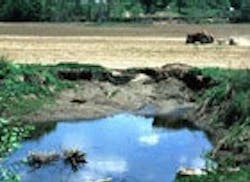EPA to Phase Out Herbicides Linked to Arsenic Runoff
The U.S. Environmental Protection Agency (EPA) plans to phase out herbicides linked to arsenic contamination in water supplies, Greenwire reported.
The organic arsenicals contain the active ingredients MSMA, DSMA and CAMA. They sell under the trade names Scotts Post Emergent Crabgrass Control, Gordon's Crabgrass and Nutgrass Killer and Ferti-Lome Crabgrass and Dallis Grass Killer, EPA announced last week.
The chemicals kill weeds without damaging grass and can be applied after weeds are visible They are used on cotton, fruit and nut trees, golf courses, athletic fields, parks and lawns.
The main concern about these herbicides is the potential for the products to transform into a more toxic form of inorganic arsenic in soil, where they can contaminate water supplies through soil runoff, EPA found. Tests found levels of arsenic in drinking water linked to pesticides that raised cancer concerns, the agency said.
EPA determined in 2006 that all uses for the active ingredients could not be re-registered under the Federal Insecticide, Fungicide and Rodenticide Act, or FIFRA.
The announcement of a gradual phaseout seeks to end many product uses by the end of 2009. The announcement exempts cotton, the agency said, because there are no satisfactory alternatives for that crop and tests show it is unlikely for residues of inorganic arsenic to remain in the meat and milk of animals that have been fed MSMA-treated cotton byproducts.
The agreement would limit the herbicides' use near vulnerable groundwater, require buffer zones around surface waters, restrict the number of applications and only allow spot treatment use on golf courses. It calls for a four-year phaseout for use on golf courses, sod farms and highway rights-of-way.
EPA said the move will "accelerate the transition to new, lower risk herbicides."
Jay Feldman, executive director of Beyond Pesticides, an advocacy group, said EPA should have banned the herbicides outright, Greenwire reported.
"They're allowing exposure to a known carcinogen that's totally unnecessary," Feldman said. "You can see the extent of compromise in this agreement -- it has lot of Achilles' heels, including the retained use of cotton. This shows that the agency's culture needs to change. It should not be about managing the well-being of the chemical industry."
Jim Kunstman, director of regulatory services for PBI/Gordon Corp., the maker of Gordon's Crabgrass and Nutgrass Killer and other MSMA-containing products, said the phaseout time frame is quick for products that he said have been used since the 1970s.
Kunstman said EPA will continue looking at what happens to the products once they have been applied and whether the chemicals are transformed into the more toxic inorganic arsenic.
"There is still some question of, 'Is it as hazardous as some have claimed because there's a difference between organic arsenicals and inorganic?'" Kunstman said. "That's one of the big areas EPA is still looking at."
EPA said it will publish a notice of data availability in the Federal Register next month, according to Greenwire.
Source: Greenwire
